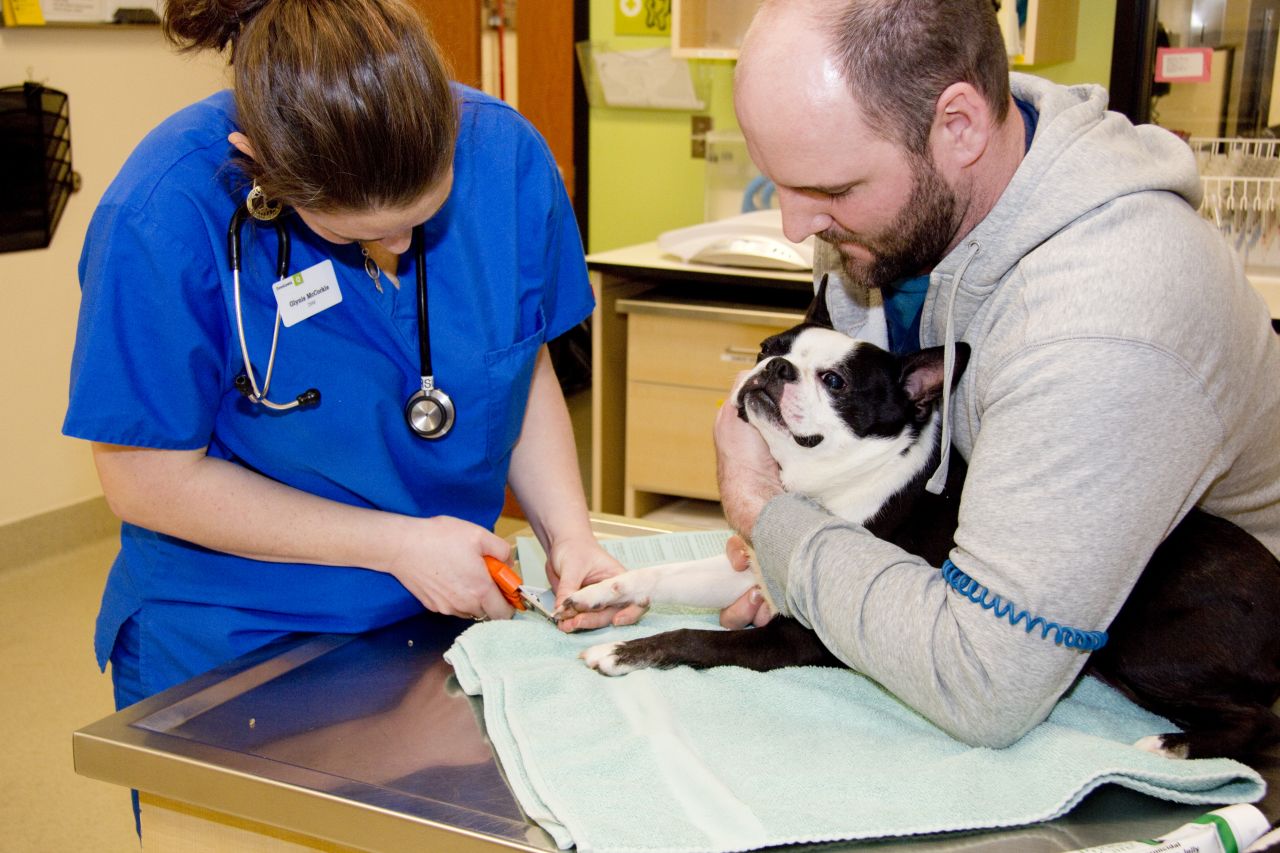When I tell people I work at a veterinary clinic their response has led me to conclude that they think I spend my day playing with puppies and kittens. While singing. (After having bluebirds help me get dressed in the morning.)
Okay, so it’s possible I am exaggerating. Pigeons actually help me get dressed. But, really, it is true that people often do not realize that our non-profit emergency and ICU hospital (DoveLewis Emergency Animal Hospital) is very similar to a human healthcare hospital. We have all the same services of a human hospital: a CT scanner, a telemetry unit, renal replacement therapy, a blood bank, grief counseling, a teaching program, a surgical unit, a critical care unit, oncology, cardiology…yes, there is such a thing as a veterinary cardiologist. Think Grey’s Anatomy with pets and less over-acting.
According to the Bureau of Labor Statistics, there are about 26,000 vet clinics nationwide and about 55,000 employed veterinarians. Compare that to the number of employed civil engineers, 263,000, and you can see from a recruiting perspective the challenge we face when we are looking to hire. We’re niche. And by niche I mean if we were a city we wouldn’t even have a highway that goes through us. And it’s possible the state wouldn’t let us use the term “city.”
So, in a market where there are few candidates to chose from, how do you hire and hire only the very best?
Niche Job Boards and websites: Not to disrespect the major job boards, but when it comes to hiring a veterinarian, I need to go where my candidates are. PS: they aren’t where everyone else is. Veterinarians are looking for jobs on veterinarian specific sites (i.e. Veterinary Information Network, Veterinary Career Network) and in trade publications (i.e. JAVMA, JVECC), and they are all over Facebook. Twitter is coming soon to a veterinarian near you (we’re a little behind), but to get the most traction for my ads, I need to go niche. Veterinarians for the most part missed the LinkedIn train; we’ll catch it next time around, if it is still running.
Reputation: In a small community like ours, reputation is everything. Literally. It’s like high school. I could go door to door to clinics recruiting, but if we had a bad reputation, we wouldn’t get any candidates. Reputation management is a blog post for another day, but what your employees really think of you (your real, feet-on-the-street reputation) is critical when recruiting in a small market. The internet can say anything you want it to; however, if we practiced bad medicine and had a bad culture, our community would know it. We work really hard to make sure that in addition to providing state of the art care for our patients, we provide a dynamic and state-of-the-art culture for our staff. A good reputation = great job candidates. If you learn anything from this blog post, learn that. Talent acquisition is just a piece of human resources and all the pieces play an important role in both recruitment and retention.
Define your hire: There are some veterinarians who chose their careers based on their dislike of people. We do not hire those veterinarians. Are they un-hirable? Not at all – they are just un-hirable at DoveLewis. We have developed four core competencies of our successful employees. The first three are:
- adaptability – nothing is predictable in emergency medicine,
- judgment – the ability to think through issues and ask for help,
- and self-motivation – we are a group of highly functional type A personalities; no loitering is tolerated.
The last, and most important one is standard of care of our patients, clients and co-workers. It isn’t enough to be a great medical doctor at DoveLewis. We understand that to give our animal patients the very best care, we must empathize and communicate well with our human clients. You also have to be nice to the staff around you, otherwise they won’t give you a heads up that the cat you’re about to pick up has a tendency to pee when held.
Work it! Veterinarians have tangible and measurable skills. For every medical position we hire, the candidate spends four to six hours on our hospital floor. We look at their medical skills, how they interact with team members and if they ask for help or freeze up when it gets busy. That being said, the general rule of thumb when we have a working interview is that it will be during the slowest day we have ever seen in our history. In that case, we want to see how our candidate handles down time.
Know your strengths and use them: Have I mentioned we are a state-of-the-art medical facility? I know, about three times. This is one of our greatest assets in recruiting. Every candidate who comes in the door gets a tour of our hospital. We do this for several reasons. First, we like to hear what questions our candidates ask on the tour; it gives us a sense for what cases they have seen, what equipment they’ve used in the past, and whether they feel overwhelmed or comfortable on our hospital floor. We also use the tour for the candidate. I am a firm believer that every candidate who comes through the door is interviewing us as well. And they should–they’ll spend a lot of time here, so it is important that we are on the same page from a medical philosophy perspective. Finally, our hospital rocks. I want everyone who comes through the door to know if they have an emergency in Portland, we are the place to go.
It’s not just about medicine: A high level of medical acumen is very important for us in a new veterinarian, but so is that standard of care for clients and co-workers. Not surprisingly, I am a big proponent of the behavioral interview. Here are some of my favorite questions:
1. Describe a time you had to work with a client who had a very different point of view about their pet than you did. What was the situation and how did you handle it?
Many of our clients come through our doors with less than ideal situations. The most important part is that they came to us for help. With the exception of abuse cases, I want to hear someone describe a situation in which they understand we are not here to judge. Our primary job is to help our patients, and we can only do this in cooperation with their owners.
2. Tell us about a time you disagreed with another doctor’s management of a case? How did you handle it?
Healthy disagreements about the medical management of a case are critical to a high standard of medicine. We want our doctors to think! In this question I am looking for their ability to think through their decisions, be okay with healthy conflict, learn, and, in the end, do what is best for the patient.
3. What is the most helpful criticism you’ve ever received?
I am looking for several things with this question, but I mostly want to know how you take feedback. Did you validate or dismiss it? Criticism is the key to professional growth. Egomaniacs need not apply.

Want to learn more about the staff at DoveLewis Emergency Animal Hospital? Visit our educational website: atdove.org.
Monica Maxwell, SPHR is the Director of Human Resources for DoveLewis Emergency Animal Hospital. She has twelve years of experience working in both public and private sector.
SmartRecruiters is the Hiring Platform that Makes Hiring Easy.











